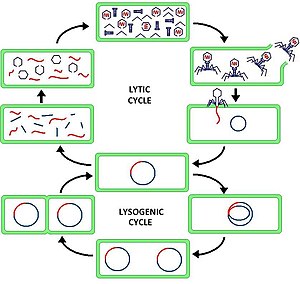
Back دورة حالة Arabic বিগলনকারী চক্র Bengali/Bangla Cicle lític Catalan سووڕی شیبوونەوە CKB Lytischer Zyklus German Ciclo lítico Spanish چرخه لیتیک Persian Cycle lytique French Siklus litik ID 용균성 생활사 Korean

The lytic cycle (/ˈlɪtɪk/ LIT-ik) is one of the two cycles of viral reproduction (referring to bacterial viruses or bacteriophages), the other being the lysogenic cycle. The lytic cycle results in the destruction of the infected cell and its membrane. Bacteriophages that can only go through the lytic cycle are called virulent phages (in contrast to temperate phages).
In the lytic cycle, the viral DNA exists as a separate free floating molecule within the bacterial cell, and replicates separately from the host bacterial DNA, whereas in the lysogenic cycle, the viral DNA is integrated into the host genome. This is the key difference between the lytic and lysogenic cycles. However, in both cases the virus/phage replicates using the host DNA machinery.